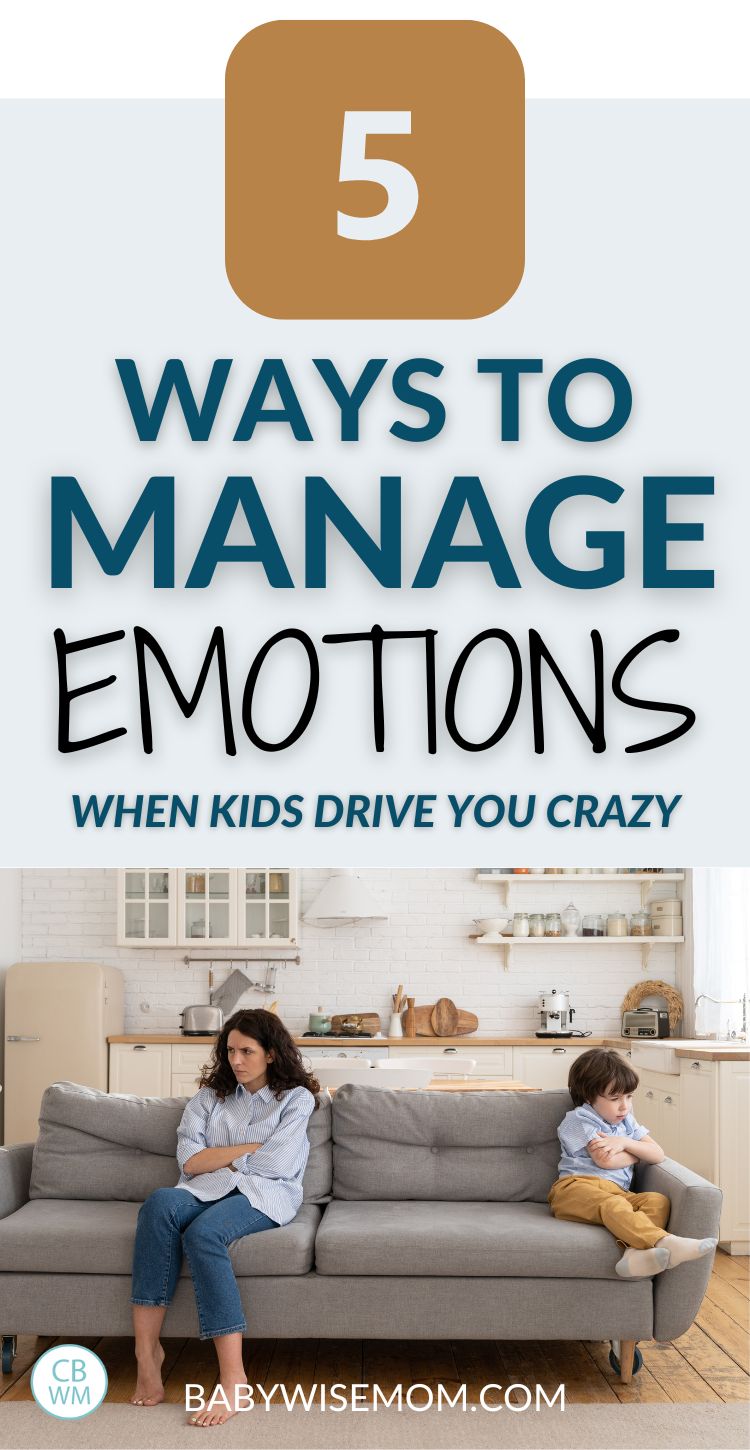5 actionable tips for parents to be able to manage their emotions when kids are hard. Advice from a family therapist and triplet mom!

by Jessica Hayes
Every mom has been there. Your kids are adorable, making you smile, and life is feeling good… until suddenly, they’re picking on their siblings, throwing a tantrum, or whining for no apparent reason.
We love our kids, but sometimes they drive us crazy.
Our emotions might make sense, as we start to feel impatient, frustrated, or angry. But how we handle those tough emotions matters.
Not only do we want to teach our kids how to manage their own emotions, but we also want to get ourselves back to a more calm and happy place too! We don’t want our response to our kids’ attitudes or behaviors to create a negative interaction or relationship.
As a therapist, I’ve spent over a decade specializing in family dynamics and helping moms build great relationships with their kids. And as a mom, I know the frustration of whiny toddlers and constant sibling bickering!
Emotions are tough. Even when our kids are not managing their emotions well, we need to practice managing our own emotions well.
Post Contents
5 Actionable Steps to Manage Our Emotions
Typically, when our kids are driving us crazy, we do not have the luxury of walking away to get 20 minutes of alone time to calm down. We often have to stay present with our kids and finish out the interaction.
Thankfully, there are some action steps we can take that help us to manage these in-the-moment emotions of impatience, frustration, or anger.
Pause
As soon as you notice your rising emotions, take a pause.
Don’t say anything. Don’t respond. (Unless, of course, it’s an immediate safety issue!)
Pausing will slow down the interaction and give you time to respond intentionally instead of emotionally.
You may need to “bite your tongue” as the cliche goes because in the moment of high emotion, you can’t trust the words or the tone of voice that will come out.
Emotions tend to lower our logical problem-solving abilities, and pausing will help you get the emotion under control.
Take a few slow, deep breaths
When you are getting upset, your body goes into reaction mode.
It is common to start to feel flushed, for your heart to beat faster, and for your muscles to tense up. Your breathing may get more shallow or fast.
So, while you’re pausing, shift your focus away from the emotion and toward your breathing.
Take slow, deep breaths. Take 3-5 seconds for each step of your breathing: inhale, hold the breath, exhale, hold the exhale.
Doing this several times in a row will get more oxygen to the brain, calm your body’s emotional reaction, and help you to respond more reasonably to your child.
Name the emotion, and recognize that it’s okay
Tough emotions can easily escalate into even tougher emotions. Impatience builds to frustration which winds up in anger.
The earlier that you can recognize this process is happening, the sooner you can interrupt the natural escalation. In fact, this is a really helpful step to say out loud to your kids, to help them also build their emotional vocabulary!
Simply acknowledging “I am feeling really upset right now” or maybe “I am getting really frustrated” puts words to the hard emotions.
And these emotions are valid. They might not always make sense to an outside observer, but that’s okay.
Labeling the emotion, without blaming or criticizing someone else for creating the emotion in you, makes it easier to now deal with the emotion itself.
And if you’re stuck on naming the emotion, print a simple emotions list from the internet and hang it on your refrigerator for reference.
Redirect your attention
You’ve probably done this with your toddler many times: you notice they are upset, so you change the activity or offer a different toy. You redirect them.
Well, you will find the same action is helping for your own emotions!
Perhaps your kids are older and you can leave the room, do something fun or relaxing, and come back when you are calm.
Even if you cannot leave the situation, perhaps because it isn’t safe for your kids to be left alone, you can still redirect your attention.
One option is to change the conversation with your child, maybe by asking an unrelated question or bringing up a new topic.
You can also redirect your attention inside your own head, making a mental list of things you love about your child or what you are thankful for today.
If your kids are young, you could do something silly or start singing a song – it will distract them and you!
Smile and say something kind
It is likely that while your tough emotions are rising, you are starting to frown or furrow your brow and your thoughts are not focused in a very happy direction.
So change that!
You might not feel like smiling, but moving your facial muscles into a smile (not with gritted teeth, mind you – a real smile) will trigger your brain to start calming down.
In the same way, you might not feel particularly kind or grateful at the moment, but when you force yourself to acknowledge and then say out loud something kind to your child, or share something you are thankful for, your thought process moves in a calmer direction.
If you find that this is really difficult for you, make a gratitude list during a calmer moment of the day, and hang it on the refrigerator as a reminder.
Will these action steps erase tough emotions from your family life? Of course not. Emotions are simply a part of who we are, and there are plenty of valid reasons to feel frustrated or angry.
Conclusion
Ultimately, the emotion itself is not the concern. Our response to the emotion is much more important. As our kids learn to handle their own emotions, words, and behaviors, we can show them a healthy way as we manage our tough emotions well.
Bio
Jessica is a mom of triplet toddlers, with another on the way. She is passionate about family relationships and has spent 10+ years as a marriage and family therapist helping women strengthen their marriages, parenting, and faith. Today, Jessica is at home with her kids and hosts the Love Your People Well Podcast. You can learn more at www.loveyourpeoplewell.com.
Jess has also written the following on this blog: Infertility, Embryo Adoption, and the Joy of Motherhood and Real Life with Triplets: Pregnancy to Delivery to Toddlerhood

Related Posts
- How To Respond to Your Emotional Preschooler
- Addressing the Emotional Needs of a Gifted Child
- Helping Pre-Toddlers with Intense Emotions
- 4 Important Ways You Can Be a Mindful Parent

